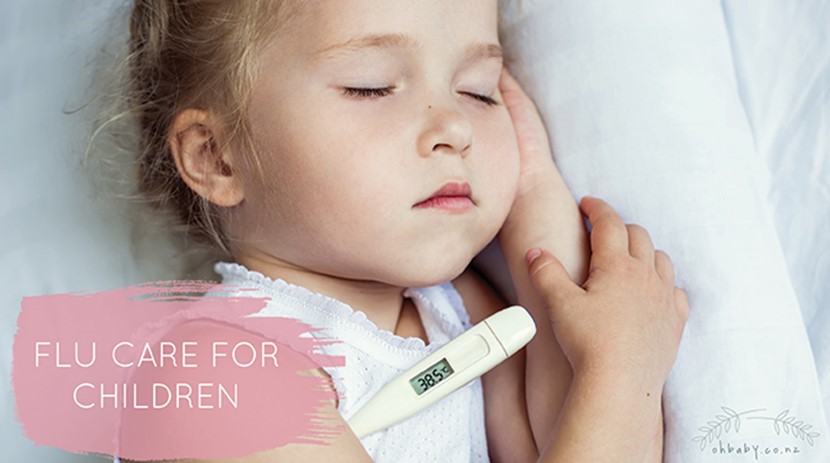Fighting the flu (influenza) in children

- flu is very easy to catch so good hygiene is very important to reduce spread
- even if your child is fit and healthy, they can easily catch the flu
- yearly flu immunisation offers the best protection
- keep infected children away from other people and don't send your child to day care or school if they have the flu
- contact your doctor if you are concerned about the severity of your child's symptoms, they are under 12 months old, or have a chronic (long-lasting) medical condition
What is the flu?
Influenza, commonly called 'the flu', is an infection caused by the influenza virus. It affects the nose, throat, lungs and other parts of the body. The flu can be a serious and sometimes life-threatening infection. It infects many people every year, mostly during the winter months in New Zealand.
What are the symptoms?
Flu in young children and babies usually causes at least two or three of the following symptoms:
- a fever that starts suddenly (a temperature equal to or greater than 38 degrees Celsius)
- body aches or pains
- headache
- dry cough which may become moist,
- sore throat
- low energy or fatigue
- chills or shivering
- runny or stuffy nose
With the flu, people are generally more unwell and flu symptoms may last longer.
Occasionally, flu can cause serious illness. This depends on the type of virus and a child's age and general health. The flu can be more serious in children who also have a long-lasting (chronic) disease. Your doctor can provide more advice if this is the case with your child.
Is it easy to catch the flu?
The flu virus is very easily spread and anyone can catch it - it doesn't matter how fit and healthy your child is.
It can spread through the air by coughing and sneezing as well as by hands, cups and other objects that have been in contact with an infected person's mouth or nose.
How can I prevent my child from catching the flu?
Flu immunisation offers the best protection. For more information, our immunisation section:
The following will also reduce the risk of catching the flu:
- everyone in the family washes their hands regularly and thoroughly, including (but not only) before preparing food and eating. Make sure everyone dries them well too. Soap and water for 20 seconds, then 20 seconds drying. Or use a hand sanitiser
- use tissues to cover coughs and sneezes and then put it in the rubbish bin (and then wash and dry hands)
- clean surfaces regularly in the bathroom and the kitchen
- keep your distance - from sick people
- keep your child at home if he or she is sick. Don't send them to school or day care until they are well
- if you become sick – stay at home, don't go to work
How do I treat the flu?
Most children fight off the infection by themselves.
Antibiotics are not helpful for the flu and your doctor won't prescribe them unless your child also has a bacterial infection.
Never give your child or young person aspirin as this may increase the risk of Reye syndrome, which is a rare and serious illness.
Continue with your child's usual medications (such as those for asthma, diabetes and epilepsy).
How can I care for my child?
- if your child is miserable because of fever or aches and pains, you can give paracetamol to make them more comfortable. You must follow the dosage instructions on the bottle. It is dangerous to give more than the recommended dose
- give your child regular drinks (water, diluted fruit juice, milk)
- use saltwater drops (saline) to treat a stuffy nose - ask your pharmacist or family doctor for instructions
- keep your child at home and resting until they are well
- put a rolled up blanket under the top of the mattress to raise the bed a little. This can help alleviate a blocked nose
- don't let them get too hot. Your child may want to be covered by blankets because they feel shivery, but if they have a temperature, try to make it a cotton blanket.
When should I seek help?
Contact your doctor if you think your child has the flu and:
- is less than 12 months old
- was born prematurely and is less than two years old
- has been in hospital within the last three months
- has a long-lasting (chronic) condition such as heart disease, cystic fibrosis or other lung condition, asthma, diabetes, an organ transplant, cancer or leukaemia
You should see a doctor urgently if your child of any age:
- is drinking less than half of their normal breastmilk or other fluid
- is having fewer than four wet nappies in 24 hours
- is severely irritable and is not wanting to be held
- improves and then suddenly becomes worse
- doesn't seem to be improving or you are concerned for any reason
Dial 111 within New Zealand for urgent medical help (use the appropriate emergency number in other countries) if your child:
- has blue lips and tongue
- has severe difficulty breathing
- has any episodes of irregular or stopping breathing
- has a worrying rash especially one that does not go away when you press on it
- is unconscious or you can’t wake them up properly
Source: http://www.kidshealth.org.nz/flu-influenza

